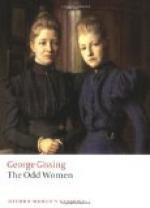Never before had Rhoda been tempted to commit a break of confidence such as in any one else she would have scorned beyond measure. She had heard, of course, of people secretly opening letters with the help of steam; whether it could be done with absolute security from detection she did not feel sure, but her thoughts dwelt on the subject for several hours. It was terrible to hold this letter of Everard’s writing, and yet be obliged to send it away without knowledge of the contents, which perhaps gravely concerned her. She could not ask Miss Barfoot to let her know what Everard had written. The information might perhaps be voluntarily granted; but perhaps not.
To steam the back of the envelope—would it not leave marks, a rumpling or discoloration? Even to be suspected of such dishonour would be more bitter to her than death. Could she even think of it? How she was degraded by this hateful passion, which wrought in her like a disease!
With two others which that day had arrived she put the letter into a large envelope, and so dispatched it. But no satisfaction rewarded her; her heart raged against the world, against every law of life.
When, in a few days, a letter came to her from Miss Barfoot, she tore it Open, and there—yes, there was Everard’s handwriting. Mary had sent the communication for her to read.
’DEAR COUSIN MARY,—After all I was rather too grumpy In my last note to you. But my patience had been desperately tried. I have gone through a good deal; now at last I am recovering sanity, and can admit that you had no choice but to ask those questions. I know and care nothing about Mrs. Widdowson. By her eccentric behaviour she either did me a great injury or a great service, I’m not quite sure which, but I incline to the latter view. Here is a conundrum—not very difficult to solve, I dare say.
’Do you know anything about Arromanches? A very quiet little spot on the Normandy coast. You get to it by an hour’s coach from Bayeux. Not infested by English. I went there on an invitation from the Brissendens; who discovered the place last year. Excellent people these. I like them better the more I know of them. A great deal of quiet liberality—even extreme liberality—in the two girls. They would suit you, I am sure. Well instructed. Agnes, the younger, reads half a dozen languages, and shames me by her knowledge of all sorts of things. And yet delightfully feminine.
’As they were going to Ostend I thought I might as well follow them, and we continue to see each other pretty frequently.
’By-the-bye, I shall have to find new quarters if I come back to London. The engineer, back from Italy after a longer absence than he anticipated, wants his flat, and of course must have it. But then I may not come back at all, except to gather my traps. I shall not call on you, unless I have heard that you don’t doubt the assurance I have now twice given.—Your profligate relative,




